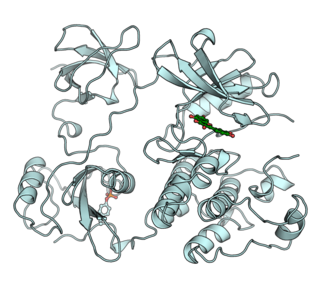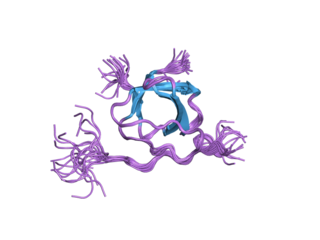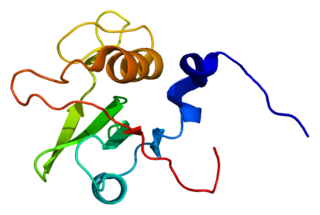
An oncogene is a gene that has the potential to cause cancer. In tumor cells, these genes are often mutated, or expressed at high levels.

A tyrosine kinase is an enzyme that can transfer a phosphate group from ATP to the tyrosine residues of specific proteins inside a cell. It functions as an "on" or "off" switch in many cellular functions.

Lck is a 56 kDa protein that is found inside specialized cells of the immune system called lymphocytes. Lck is a tyrosine kinase, which phosphorylates tyrosine residues of certain proteins involved in the intracellular signaling pathways of these lymphocytes. It is a member of the Src family of tyrosine kinases.
Rous sarcoma virus (RSV) is a retrovirus and is the first oncovirus to have been described. It causes sarcoma in chickens.

Growth factor receptor-bound protein 2 also known as Grb2 is an adaptor protein involved in signal transduction/cell communication. In humans, the GRB2 protein is encoded by the GRB2 gene.

Proto-oncogene c-KIT is the gene encoding the receptor tyrosine kinase protein known as tyrosine-protein kinase KIT, CD117 or mast/stem cell growth factor receptor (SCFR). Multiple transcript variants encoding different isoforms have been found for this gene. KIT was first described by the German biochemist Axel Ullrich in 1987 as the cellular homolog of the feline sarcoma viral oncogene v-kit.
The gag-onc fusion protein is a general term for a fusion protein formed from a group-specific antigen ('gag') gene and that of an oncogene ('onc'), a gene that plays a role in the development of a cancer. The name is also written as Gag-v-Onc, with "v" indicating that the Onc sequence resides in a viral genome. Onc is a generic placeholder for a given specific oncogene, such as C-jun..

Adapter molecule crk also known as proto-oncogene c-Crk is a protein that in humans is encoded by the CRK gene.
v-Src is a gene found in Rous sarcoma virus that encodes a tyrosine kinase that causes a type of cancer in chickens.

Proto-oncogene tyrosine-protein kinase Fyn is an enzyme that in humans is encoded by the FYN gene.

Tyrosine-protein kinase Lyn is a protein that in humans is encoded in humans by the LYN gene.

Cbl is a mammalian gene encoding the protein CBL which is an E3 ubiquitin-protein ligase involved in cell signalling and protein ubiquitination. Mutations to this gene have been implicated in a number of human cancers, particularly acute myeloid leukaemia.

Protein tyrosine kinase 2 beta is an enzyme that in humans is encoded by the PTK2B gene.

Proto-oncogene tyrosine-protein kinase Src, also known as proto-oncogene c-Src, or simply c-Src, is a non-receptor tyrosine kinase protein that in humans is encoded by the SRC gene. It belongs to a family of Src family kinases and is similar to the v-Src gene of Rous sarcoma virus. It includes an SH2 domain, an SH3 domain and a tyrosine kinase domain. Two transcript variants encoding the same protein have been found for this gene.

Breast cancer anti-estrogen resistance protein 1 is a protein that in humans is encoded by the BCAR1 gene.

Proto-oncogene tyrosine-protein kinase Yes is a non-receptor tyrosine kinase that in humans is encoded by the YES1 gene.

Gardner-Rasheed feline sarcoma viral (v-fgr) oncogene homolog, also known as FGR, is a protein which in humans is encoded by the FGR gene.

Tyrosine-protein kinase Fes/Fps also known as proto-oncogene c-Fes/Fps is an enzyme that in humans is encoded by the FES gene. FES was originally cloned as a retroviral oncogene from feline (v-FES) and avian (v-FPS) sarcomas. This triggered the subsequent identification and cloning of the cellular FES (c-FES) genes in birds and mammals.
Non-receptor tyrosine kinases (nRTKs) are cytosolic enzymes that are responsible for catalysing the transfer of a phosphate group from a nucleoside triphosphate donor, such as ATP, to tyrosine residues in proteins. Non-receptor tyrosine kinases are a subgroup of protein family tyrosine kinases, enzymes that can transfer the phosphate group from ATP to a tyrosine residue of a protein (phosphorylation). These enzymes regulate many cellular functions by switching on or switching off other enzymes in a cell.
Joan S. Brugge is the Louise Foote Pfeiffer Professor of Cell Biology and the Director of the Ludwig Center at Harvard Medical School, where she also served as the Chair of the Department of Cell Biology from 2004 to 2014. Her research focuses on cancer biology, and she has been recognized for her explorations into the Rous sarcoma virus, extracellular matrix adhesion, and epithelial tumor progression in breast cancer.














